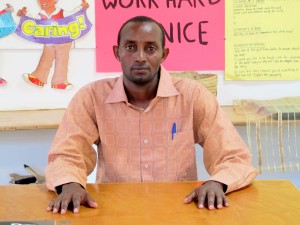Sebastian Lolkirik
Title: teacher
Subject: Standard 2
Hometown: Maralal, Samburu County, Kenya (200 Km southwest of Ndonyo Wasin) [Sebastian says that Maralal is the headquarters of Samburu County and is about the size of Isiolo (a town on the way to Ndonyo Wasin)].
Bio: Sebastian is Samburu and his first language is Samburu, followed by Kiswahili, then English. He said that the climate in Ndonyo Wasin is very harsh compared to where he is from in the Highland Samburu County. Sebastian said that the Maralal area is not as hot and that rains usually come from April to July. He said that they Samburu in this area keep animals (goats, cows, camels, sheep) and do some substance farming of maize, beans, and wheat. Sebastian says that their diet still consists of the traditional milk and meat, but now because the economy is difficult, they do some farming. He says a hard life requires them to do some farming.
He has 4 brothers and 2 sisters. Sebastian is the 3rd born in his family. His brothers depend on him to help put them through school. One of his brothers is a teacher. His parents never attended school and are Samburu herders.
Career:
Sebastian graduated from two-year teacher training college in 2010. Prior to teaching at Ndonyo Wasin, he taught briefly at a private school in his home area of Maralal.
He really enjoys teaching science and social studies the best.
Q&A:
How long have you been teaching here?
As of July 2012, he has been teaching at Ndonyo Wasin for 8-9 months. He was one of the newest teachers at NDW.
What made you want to become a teacher?
Sebastian originally wanted to be a high school teacher, but because he did not have enough money to attend university (four year school), he attended a two-year teacher training college to become a primary school teacher. Attending a two-year training college is the requirement to teach primary school in Kenya and university, a four-year school, is the requirement for teaching secondary school. There is no specialization for primary school teachers, but secondary school teachers need to specialize in two subjects.
Why did it interest you?
Sebastian saw a lot of illiteracy in the Samburu culture. Sebastian’s drive to help his community led him to become interested in teaching.
“There is a lot of illiteracy in Samburu. Because now, for example, now if it was not Jane or those who, those people who maybe Jane and her friends who help these people I think this world would not be here now. They would be looking after animals at those areas now. So I decided that maybe a teacher so that I could transform some of them…if it’s not all, some…make a little different. So that’s the main objective, to help my community. Yeah.”
Was there anything that surprised you when you first started teaching?
No answer-conversation went elsewhere.
Is there anything that you would like to know from our teachers? Is there anything that you would like to ask? Is there anything that they could help you with?
Sebastian was interested in how we discipline our students.
“It is a very sensitive profession-if you don’t teach well, you spoil them.”
What do you like and dislike about teaching?
Sebastian sees teaching as a way to help children/people. He said that interacting with the local people/parents could sometimes be tricky as he found some of them to be aggressive.
Are there any resources that you feel would help you?
No answer-conversation went elsewhere.
Click here to listen to the interview.



Leave a Reply
You must be logged in to post a comment.